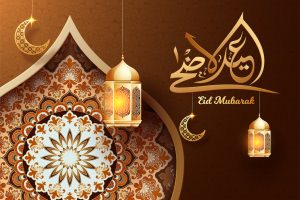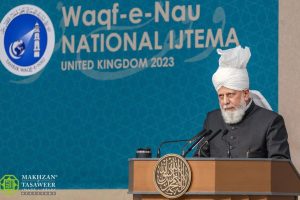
By Haafiz Abdul Rafeeq Alaka, Nigeria
The Eid al-Adha celebration carries great significance in the Islamic faith as it was originally established to remember the great sacrifice of Hazrat Ibrahim (as), Hazrat Hajar (as) and Hazrat Isma’il (as). This festival is celebrated on the 10th day of Dhul Hijjah, the 12th month of the Islamic calendar. It gathers Muslims all over the world in order to reflect over the spirit of the sacrifice of a pious family, who were ready to let go of all things for the sake of God. All over the world, the Muslim Ummah (including Nigerian Muslims) share the same spirit and sentiment on this noble day and further make the world more of a global village where every family displays their happiness and joy.
Muslims look forward to this great event with much excitement. The celebration is known in Yorùbá as ‘iléyá’ which literally translates to ‘it is time to go home’ and hints at a major characteristic of the festival. Many Nigerian Muslims travel from their places of residence and work to their ancestral hometowns and villages, disregarding distance in order to join their extended families. For some, it is the only time of the year when all family members meet to celebrate and share their experiences.
Since animal sacrifice is obligatory for those who can afford it, some families purchase the animals immediately after Ramadan or long before the Eid period since it is cheaper. In some cases, certain individuals contribute to buy a cow to be shared between them all. This is known in Hausa as ‘watanda’.
Apart from the purchase of animals for sacrifice and other special household needs, many families also try as much as possible to purchase new clothes, especially for the children.

One of the important steps taken prior to the day of Eid is the special cleaning of homes and the surrounding environment. Young Muslim men gather to weed the Eid ground and prune the trees that cast shade on the ground. It is a common practice of Muslims in Nigeria to have a separate and open ground for Eid prayers. In fact, in major towns, there are permanent Eid grounds that are often fenced off and beautified with shading trees. In some extreme circumstances, however, some do observe their Eid prayers in Mosques.
The Muslim faithful attend the Eid prayer in their finest fragranced attires.
After Eid prayers, animals such as goats, rams, cows and camels are slaughtered and their meat is shared between neighbours and acquaintances. Special delicacies are prepared and enjoyed together by friends and family. In many Nigerian communities, cooked food packed with meat from the slaughtered animals is distributed to neighbours and friends. Before the recent COVID-19 pandemic, friends and family members used to visit each other often and spend plenty of time together.




Add Comment